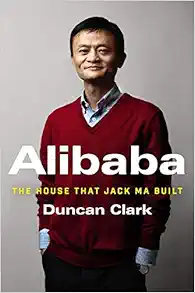
Description
Review “Anybody who thinks the Chinese just copy or steal technology from the West should read this book and think again. Jack Ma is part Bill Gates, part Steve Jobs, part Larry Page, part Sergei Brin, and part Mark Zuckerberg all rolled into one.” — Sir Martin Sorrell, CEO of WPP “Useful, business-minded reporting on an unconventional corporate magnate, containing both corporate and human-interest perspectives.” — Kirkus Reviews “This absorbing and well-written portrayal of Ma’s character, and his role in Alibaba’s development will appeal to a wide range of readers.” — Library Journal “A clean and compelling narrative…[Clark] tells the story with flair.” — Wall Street Journal “A fascinating new book.” — The Economist “A must-read for anyone hoping to navigate China’s new economy”. — Financial Times From the Back Cover An engrossing, insider’s account of how a teacher built one of the world’s most valuable companies—rivaling Walmart and Amazon—and forever reshaped the global economy In just a decade and a half, Jack Ma, a man from modest beginnings who started out as an English teacher, founded Alibaba and built it into one of the world’s largest companies, an e-commerce empire on which hundreds of millions of Chinese consumers depend. In 2014, Alibaba’s $25 billion IPO was the largest global IPO in history. A Rockefeller of his time, who is courted by CEOs and presidents around the world, Jack is an icon for China’s booming private sector and the gatekeeper to hundreds of millions of middle-class consumers. Duncan Clark first met Jack in 1999 in the small apartment where Jack founded Alibaba. Granted unprecedented access to a wealth of new material, including exclusive interviews, Clark draws on his own experience as an early adviser to Alibaba as well as his two decades in China chronicling the Internet’s impact on the country to create an authoritative, compelling narrative account of Alibaba’s rise. How did Jack overcome his humble origins and early failures to achieve massive success with Alibaba? How did he outsmart rival entrepreneurs from both China and Silicon Valley? Can Alibaba maintain its 80 percent market share? As it forges ahead into finance and entertainment, are there limits to Alibaba’s ambitions? How does the Chinese government view its rise? Will Alibaba expand farther overseas, including into the United States? Clark tells Alibaba’s tale in the context of China’s momentous economic and social changes, illuminating an unlikely corporate titan as never before. Advance Praise For Alibaba “Anybody who thinks the Chinese just copy or steal technology from the West should read this book and think again. Jack Ma is part Bill Gates, part Steve Jobs, part Larry Page, part Sergey Brin, and part Mark Zuckerberg, all rolled into one.”—Sir Martin Sorrell, CEO of WPP “Duncan Clark gets into the heart and soul of Alibaba and its founder, Jack Ma, who deftly maneuvered through the discontinuities and barriers in China to create one of the greatest companies in the world. China has thrived under the leadership of Jack Ma. This book is a must-read for anyone who wants to understand the present China and the heartbeat of a great entrepreneur.”—Tim Draper, founder of Draper Associates, DFJ, and Draper University “This book provides excellent insight into the world of Jack Ma, perhaps the most famous of the leaders of the new economy in China. Duncan Clark is a real China ‘Old Hand,’ unique in his knowledge of the Jack Ma generation. This book is definitely on the short list for those who wish to understand the Chinese economy today.”—Ken Wilcox, Chairman Emeritus, Silicon Valley Bank About the Author Duncan Clark, a former Morgan Stanley investment banker and fluent Mandarin speaker, has lived and worked in China for more than twenty years. He heads a team of more than one hundred at BDA China, the investment advisory firm he founded in Beijing in 1994. An expert on China’s Internet sector, Clark is a former visiting scholar at Stanford University, where he welcomed Jack Ma on stage as a keynote speaker, along with the leaders of other leading China Internet firms including Baidu, Sina, and Tencent. Read more
Features & Highlights
- An engrossing, insider’s account of how a teacher built one of the world’s most valuable companies—rivaling Walmart & Amazon—and forever reshaped the global economy.
- In just a decade and half Jack Ma, a man from modest beginnings who started out as an English teacher, founded and built Alibaba into one of the world’s largest companies, an e-commerce empire on which hundreds of millions of Chinese consumers depend. Alibaba’s $25 billion IPO in 2014 was the largest global IPO ever. A Rockefeller of his age who is courted by CEOs and Presidents around the world, Jack is an icon for China’s booming private sector and the gatekeeper to hundreds of millions of middle class consumers.
- Duncan Clark first met Jack in 1999 in the small apartment where Jack founded Alibaba. Granted unprecedented access to a wealth of new material including exclusive interviews, Clark draws on his own experience as an early advisor to Alibaba and two decades in China chronicling the Internet’s impact on the country to create an authoritative, compelling narrative account of Alibaba’s rise.
- How did Jack overcome his humble origins and early failures to achieve massive success with Alibaba? How did he outsmart rival entrepreneurs from China and Silicon Valley? Can Alibaba maintain its 80% market share? As it forges ahead into finance and entertainment, are there limits to Alibaba’s ambitions? How does the Chinese government view its rise? Will Alibaba expand further overseas, including in the U.S.?
- Clark tells Alibaba’s tale in the context of China’s momentous economic and social changes, illuminating an unlikely corporate titan as never before.





